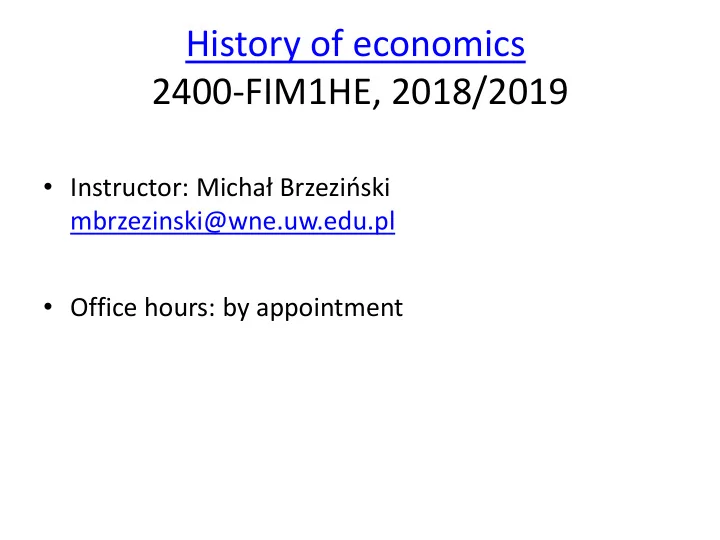

History of economics 2400-FIM1HE, 2018/2019 • Instructor: Michał Brzeziński mbrzezinski@wne.uw.edu.pl • Office hours: by appointment
Course objectives 1 ) Better understanding of modern economics through studying the historical evolution of economic ideas, concepts and methods. We will read and talk about the works of such influential economists as Adam Smith, Karl Marx, John Maynard Keynes or Milton Friedman. This knowledge will help you to – better understand contemporary economics – see how economic knowledge develops through interaction of its internal logic and the impact of external factors (such as big crises or developments in other disciplines) – realize that there are various economic schools, which offer competing explanations of economic phenomena 2) To develop some practical abilities: – cooperation (preparing a presentation in a team) – speaking and discussing the assigned readings in the class – at home and in-class writing; both short reviews/comments on assigned readings and an early academic essay (course paper)
Organization of the course • To be discussed next week • Presence in class is obligatory – you can have 4 unexcused absences throughout the year • Classes will be a mix of short lectures, discussions of the texts, student presentations, in-class writing, team work, etc. • Grading will be based on all these elements – see syllabus • Webpage: http://coin.wne.uw.edu.pl/mbrzezinski/teaching/HEeng/
Topics to be covered • Pre-classical economics (VIII c. BC -1776 AD) – (ancient Greece, physiocracy, mercantilism) • Classical Economics (1776-1870) – Adam Smith, David Ricardo, John Stuart Mill; – Reaction to classical economics – K. Marx • Neoclassical economics (1870 - ca. 1930) – Alfred Marshall, Leon Walras – Empirical vs theoretical economics – Interwar pluralism (institutionalism, historical school, Austrian school) • Modern economics (ca. 1930s – today) – Formalist revolution, mathematization, hardening of the mainstream – Marginalization of the non-neoclassical schools – Economic imperialism – The return to moderate pluralism in recent years (emergence of behavioral economics, complexity economics, computational…) – Modern economics in the face of the Great Recession of 2008
Economic ideas and concept we will discuss • Motivations of economic agents (consumers, producers): self-interest vs other motivations • Individual well-being: utility, happiness, income • Supply, demand, exchange and setting of market prices • Market equilibrium and disequilibrium • The behavior of firms • Economic fluctuations, business cycles and unemployment • Inflation and monetary policy • Economic growth and its determinants • Economic inequalities in income and wealth – determinants and consequences • Capitalism vs socialism and other theoretical economic systems • Innovations and technological progress – causes and results • For example, with respect to economic growth …
The importance of economic growth
Fouquet, Roger, and Stephen Broadberry. "Seven centuries of European economic growth and decline." The Journal of Economic Perspectives 29.4 (2015): 227-244.
Great Divergence
Economic growth is slowing down in advanced countries
Bloom, N., Jones, C. I., Van Reenen, J., & Webb, M. (2017). Are ideas getting harder to find? (No. w23782). National Bureau of Economic Research.
• So, maybe growth is the most important economic idea, but other questions are also important …
What is the invisible hand of the market?
Is capitalism doomed to fail?
Why economics has become a mathematical science?
Are free markets the optimal solution for all socio-economic problems?
How Did Economists Get It So Wrong?
Can you explain the crisis to the Queen? The Queen asked why no one had predicted the credit crunch. Can you answer her question?
Did Keynes get it right? Do we need active government policy to prevent and fight business cycles?
Are the robots coming for our jobs?
Recommend
More recommend